More Pictures
This is me with Milo (pronounced "MEE-low"), my dog. I got him as a
puppy. He was the runt of the litter and was so tiny I could hold him in
my palm. One Friday he started sneezing, as if he had really bad allergies.
Then on Saturday and Sunday, I noticed he wasn't eating or drinking anything,
and his eyes were watery. I decided to take him to the vet on Monday right
after I finished teaching. In the morning, he followed me out to the morning
assembly, just like a faithful old dog. That was the last time I ever saw
him. He never came back, and I assume he just crawled away somewhere to
die.
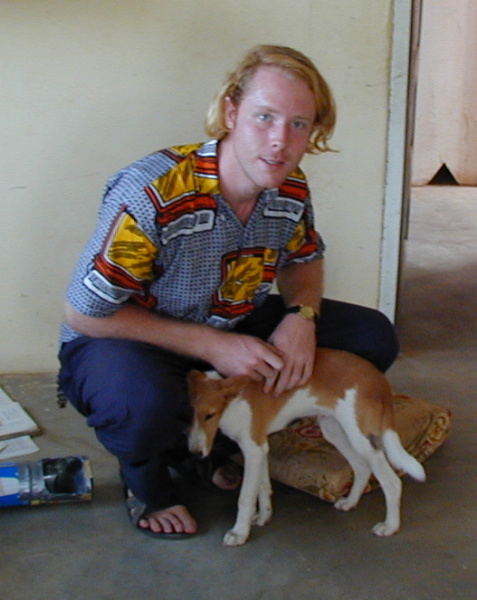
Once Milo learned that my house was his house, too, he began protecting
it. He'd bark at anything that came close to the house, including giant
millipedes like this one.
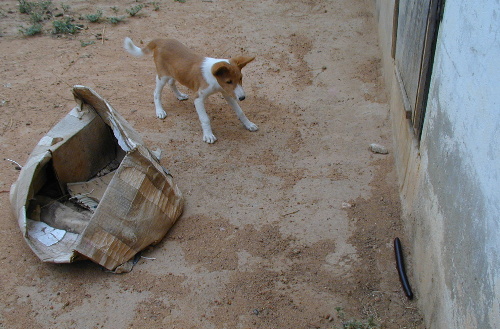
Ghana has no shortage of bats--they're everywhere, even above the ceiling
of my house. At dusk I can see them swooping out, one by one, from a small
hole in the roof, on their way to find some insects for breakfast. In the
morning they come back to sleep, hanging upside down on the rafters. Sometimes
I can hear them lose their grip and fall--BANG!--on the ceiling. One time
I was reading in bed and suddenly saw a black blur come out of nowhere.
Apparently the bat had slipped through a tiny crack in the ceiling. He
soared around the room until he ran up to the wall, did a 180, and crash-landed
on my bed. (One of the safer places to crash-land, really.) He tried flying
a few times more, always failing and coming back to my bed. He seemed to
like crawling onto my pillow, as shown in this picture. Eventually I trapped
him in a Tupperware bowl and set him free outside.
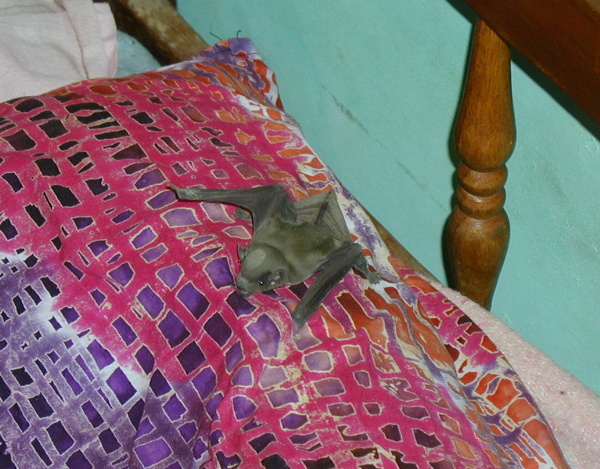
Ah, computer by candlelight! Power outages are a common thing in Tumu,
sometimes happening several times a week. But because my laptop has a battery,
I can still use it even when the electricity goes off at night. I still
need candles to see the keyboard, though.
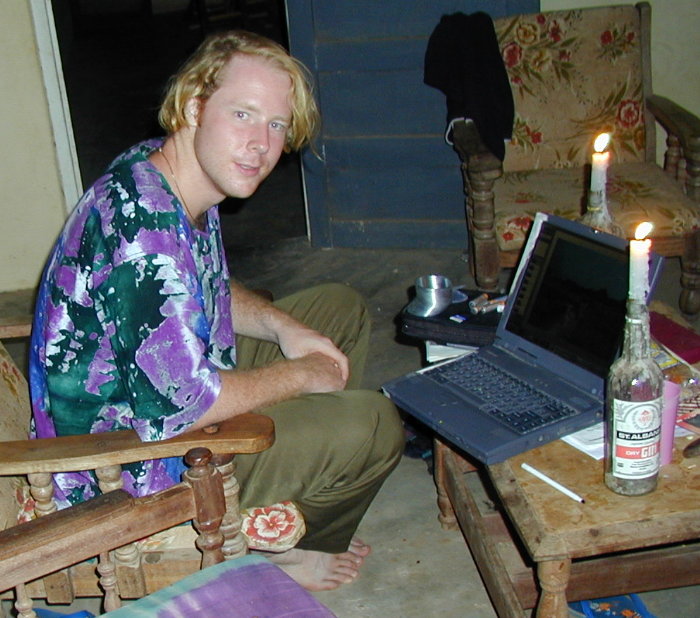
The unpleasant side of Ghana: This is my bathroom. But at least I never
have to worry about my toilet overflowing...yet.
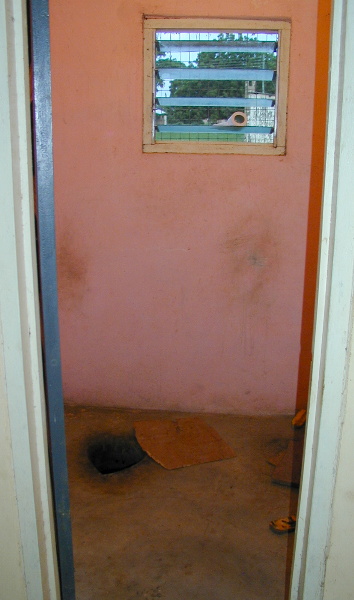
Chameleons keep out of sight, but they make at least one appearance
at the start of the rainy season. This one was lounging on an outdoor wall
of my house. (Ghanaians are very superstitious about chameleons--they think
they're signs of evil. I know one Peace Corps girl who happened to pick
up a chameleon with her hands, and when her neighbors found out about it,
they wouldn't come near her for the next two days.)
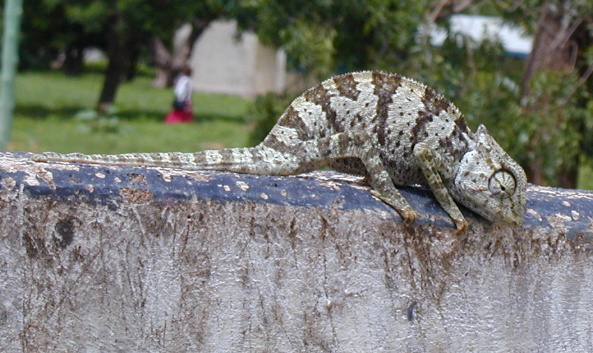
One day I was walking back home from town and saw this little girl
sitting on the ground, crying. Her older brother was trying to help her
up, but she just wouldn't stop wailing. I walked over to them and asked
what had happened. The boy said she had fallen and scraped her knee. The
wound didn't look too bad, so I figured all she needed was a little cheering
up. I squatted next to her and showed her some pictures using the tiny
screen on the back of my digital camera, which for some reason I had decided
to take along with me that day. The girl gradually stopped crying as she
watched me flip through the pictures. She seemed OK then, so I got up to
leave, but not before snapping this photo.
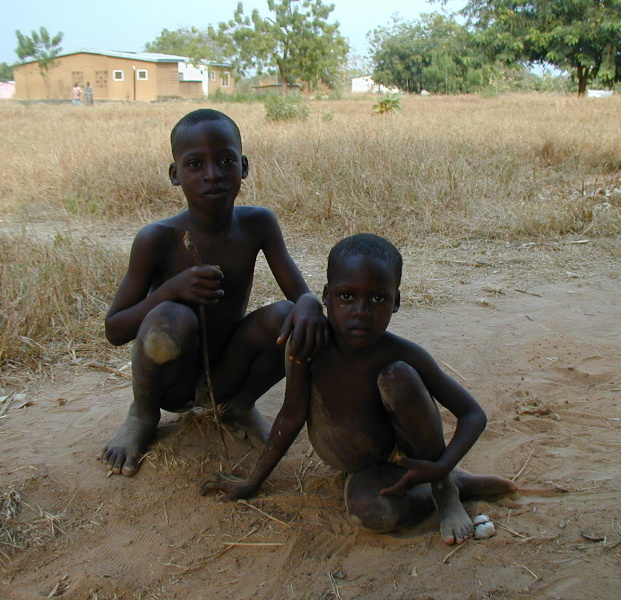
Every day, about fifty different women from my neighborhood walk to
the borehole (a deep-water well with a hand pump), fill a bucket with water,
and carry the bucket back to their house. They repeat the chore several
times a day, since the whole family needs water for cooking, bathing, and
drinking. (Men are seldom, if ever, assigned to the task.) In this photo
are two students from my school carrying water back to the girls' dormitory.
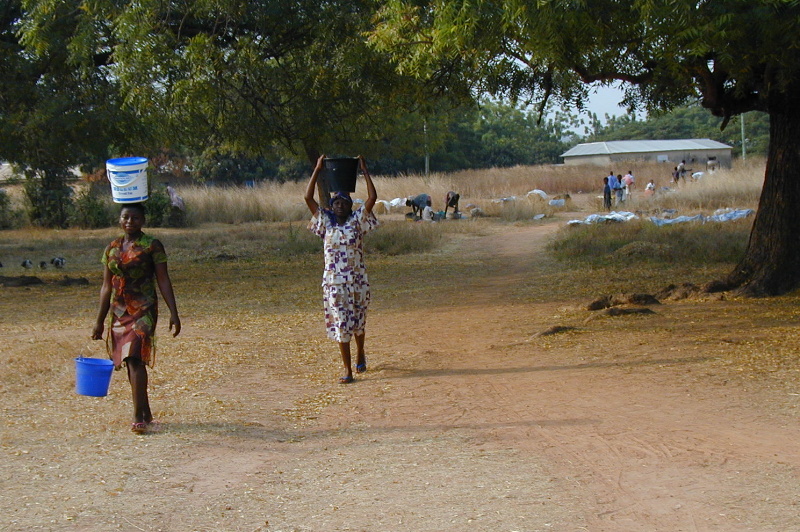
This is just some random woman in an alley in town who begged me to
snap her picture as I was walking past. I think she was cooking banku,
a dish of mushy cornmeal.
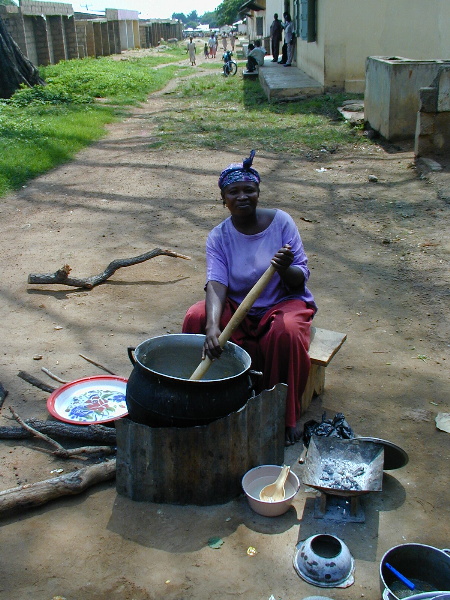
This building houses the first-year students' three classrooms. It
has no lights, no glass on the windows, and no doors--just a wooden doorframe
for each class. The floor is made of cracked concrete, and the chalkboards
are crumbling away, making whatever you write on them a challenge to read.
During the night, goats sleep inside, and the students have to sweep away
their droppings in the morning. And that metal shack in front? It's the
urinal. So...how does that compare to your own high school classrooms?
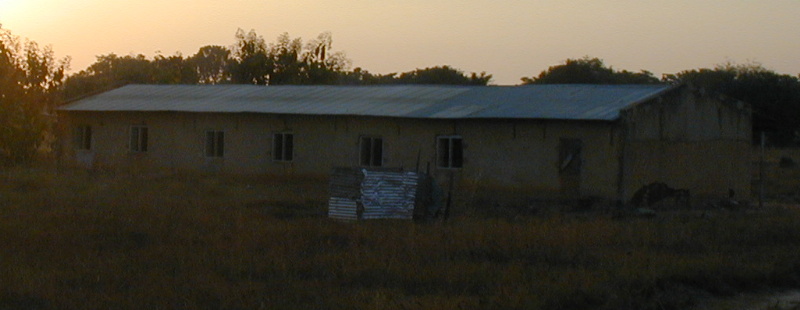
During the dry season, any spark can set off a bush fire that sweeps
across the countryside. It can damage crops and backyard gardens, so people
in town are often seen stamping them out with the branch of a tree, like
the one the guy is holding in this picture.
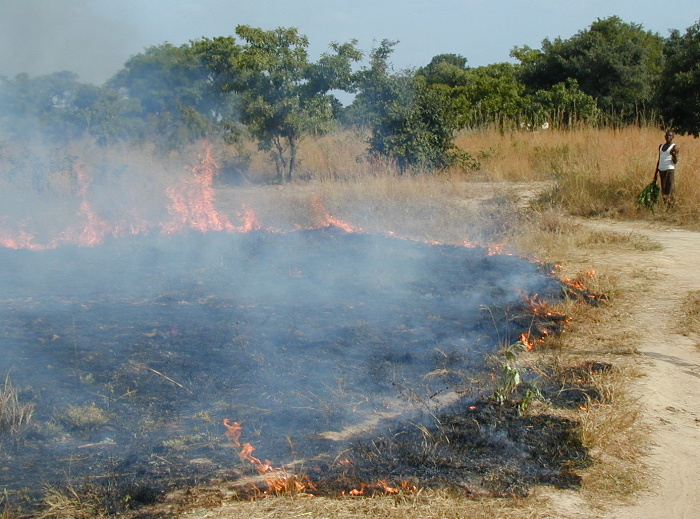
This is what my backyard looks like after a bush fire: scorched earth.
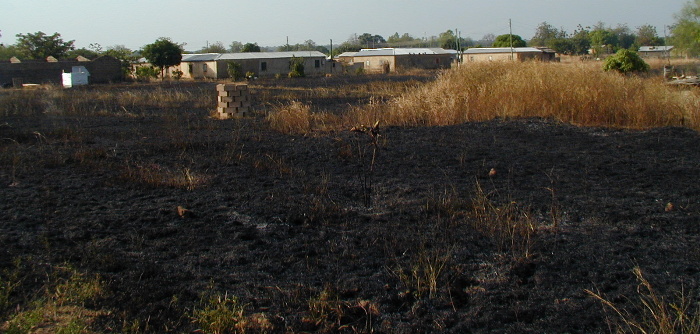
The children in my neighborhood often come to the school's soccer field
to play games or just hang out.
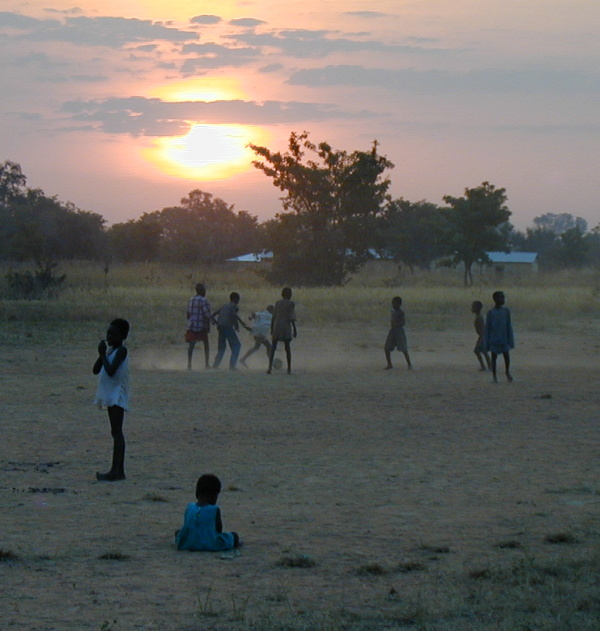
This shot was taken at dawn from the top of Tumu's telephone tower.
In the center is a well-known landmark: the largest mosque in
Tumu.
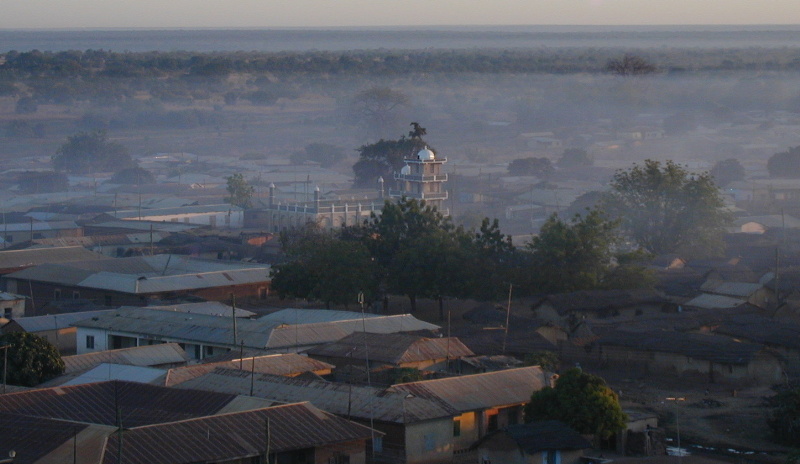
Some families in Ghana are so poor that they have to build their house
out of dried mud bricks and make a roof out of thatched grass. Homes like
this aren't much fun during the rainy season, since the roof leaks and
the walls get washed away. They have to be patched and repaired constantly.
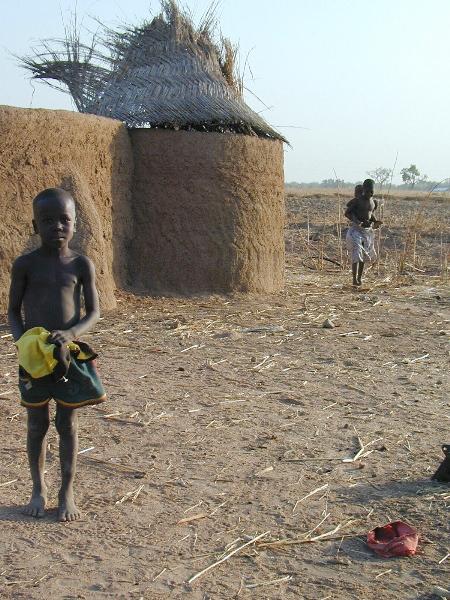
To celebrate the end of another school term, the Girls Club at my school
threw a party. Nothing special, just a get-together with a little music
and dancing. (Boys were not invited.) I brought Kool-Aid and four different
flavors of Jell-o, as you see here. They liked the Kool-Aid, but most couldn't
take more than one spoonful of the Jell-o. They hated it! They grimaced
in horror as they watched me finish every bite of Jell-o that they wouldn't
eat.
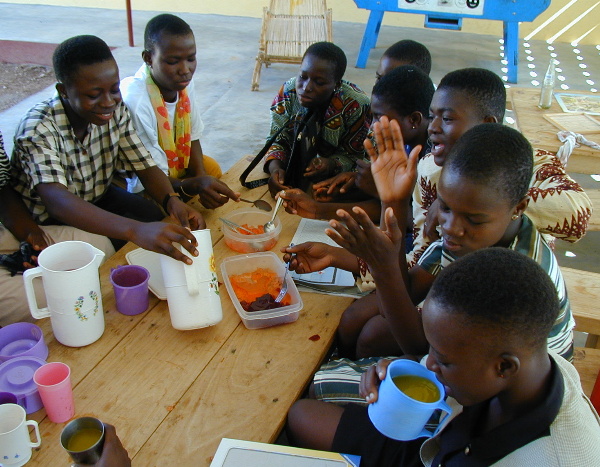
At the end of my computer classes for Girls Club members, I'd give
them an hour to play around on the computers and type whatever they want.
The most popular program for them was the Sound Recorder, which can record
anything spoken into the computer's microphone and then play it back instantly.
Usually the girls would sing a song together, like they're doing here,
and then play it back again and again.
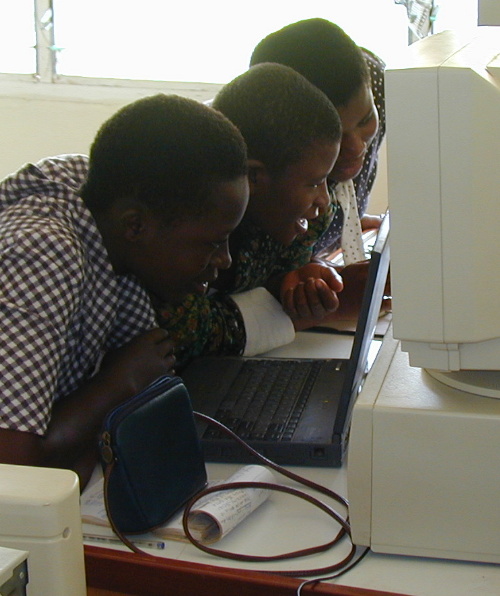
This is a portrait photo taken after a computer class with some of
the Girls Club members. (The girl in front doesn't normally look so scary;
she's just caught in middle of saying, "Cheese!")
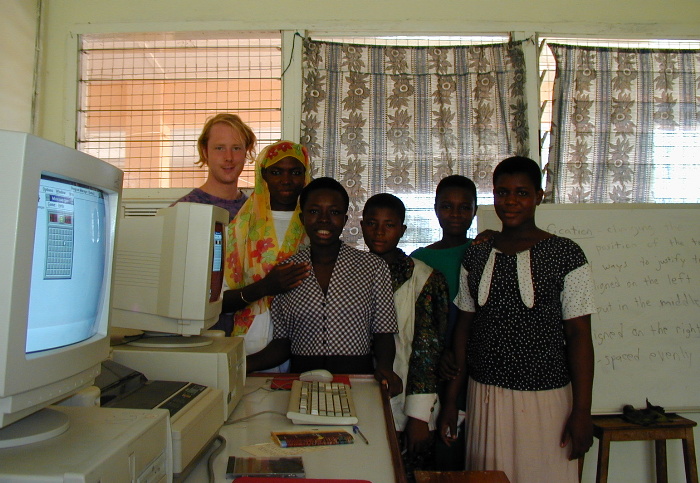
The Girls Club members seemed to like the computer classes I was giving
them, but they were a little confused about why they should be interested
in computers. After all, they said, where in Tumu can we even see a computer,
let alone get a job using one? That's when I decided to take them to the
District Assembly to see how computers are used locally. That's Abiba on
the left; she's one of the secretaries at the DA who's in charge of the
computers. She explained to the Girls Club members a little bit about her
work, then she let them try out the computers for themselves.
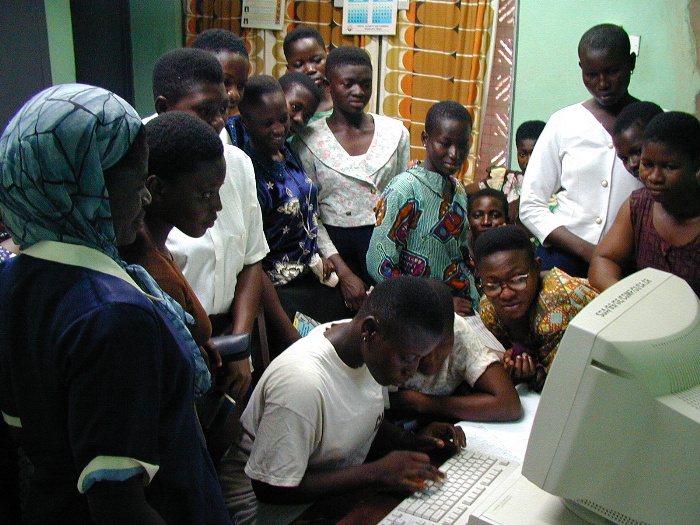
In Ghana, most schools are too poor to buy decent science equipment.
But a few years ago, the government got some money together (most of it
donated by richer countries, I believe) to build over a hundred "Science
Resource Centers" all across the country--one for each school district.
Each SRC gets computers, chemicals, microscropes, dissection kits, voltmeters,
lenses, and any other piece of equipment you could possibly need for teaching
any area of science. The physics lab even has equipment that most American
schools can't afford--a Geiger counter, for example. But the lab at my
school's SRC is hardly ever used, though, since there's only one other
physics teacher besides me, and he doesn't know how to use most of the
equipment. A lot of it is still sitting on its shelf, brand new, never
even been opened. So I got this grand idea of having a "Physics Open House".
I decided to set up all the equipment, make a little label for each station
to describe the physics principle behind it, then open the doors to the
public. It'd be like a miniature science museum. I even put signs up around
town, hoping that adults would come to see some of the cool things that
their tax dollars helped pay for (and also to learn something about physics
in the process). Unfortunately, nobody from town came, but around 200 students
showed up, so I considered it a success. I think they at least discovered
that learning physics can be fun. The picture below shows some of the equipment
at the Open House. In the foreground is me and Tammy, a Peace Corps volunteer
in Tumu working on small business development.
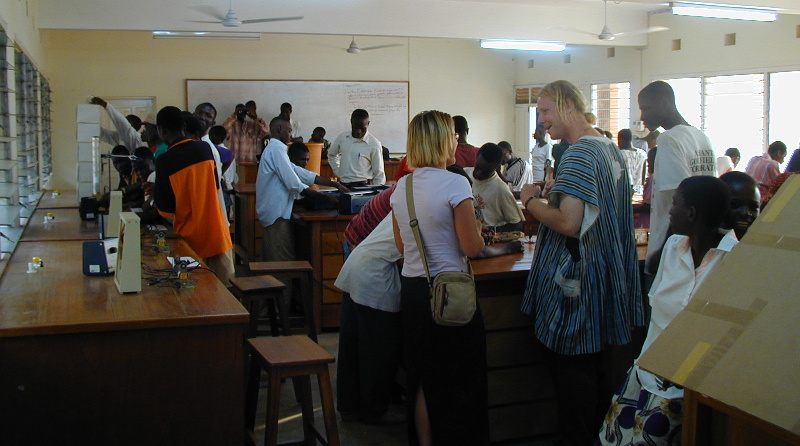
In this picture, I help some students during the Physics Open House
to fix a problem with the solar cell kit. (The thing on the right is a
"gold-leaf electroscope", used for demonstrating static electricity.)
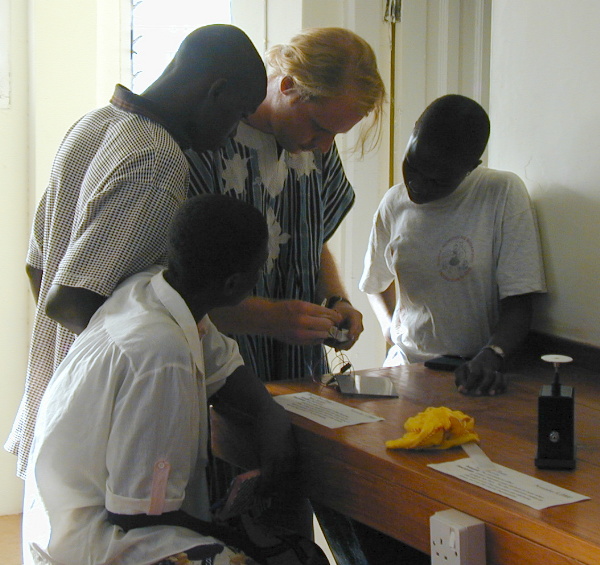
It seems my school is short of money for everything. They didn't even
have enough petty cash to buy a new hand pump for blowing up the school's
soccer ball and volley ball. I suppose I could have just donated the money
for a pump myself, but I wanted to show the students how to earn money
for themselves. So, I organized a good old-fashioned bake sale in the heart
of Tumu: the lorry station. A few students and I brought flour, sugar,
eggs, a frying pan, and a charcoal pot to the station. Then we started
frying up pancakes. After three hours, we had sold 80 pancakes and collected
20,000 cedis--just enough to cover the cost of the ingredients and still
have enough profit to buy a pump for the school.
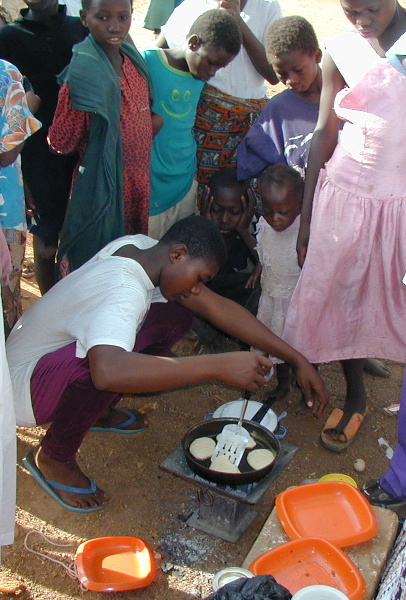
Before I left for Ghana, I got a donation from Texas Instruments for
20 programmable graphing calculators. After a term of teaching, I discovered
that although my students could factorize polynomials, they couldn't do
basic things like round numbers. (Most even need a calculator to do simple
math like 5 times 6.) The elementary and junior high schools just don't
prepare them very well. So one weekend I wrote a few programs on the calculators
to give tests on fundamental math skills. One program asks questions on
adding negative numbers; another one quizzes them on how to round numbers;
etc. The programs keep score, so I can just let them loose on the calculators
and record their scores later. I've even held contests to give an award
to the first perfect score. Here you see the students using the calculators
in a school classroom during one of my extra night classes.
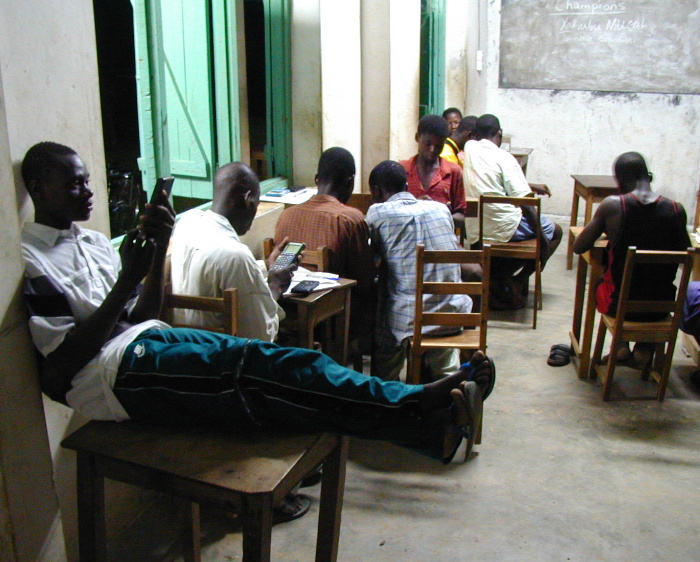
Tumu isn't too far away from Mole ("MOH-lay"), a national game reserve,
and sometimes the elephants who live there wander off. One time the bus
I was travelling in stopped suddenly, and everyone was pointing at an elephant
in the bush. We all got out for a closer look, but I was the only one stupid
enough to walk near it. That's when it started to charge me. I managed
to snap this picture just before turning around to run for my life.
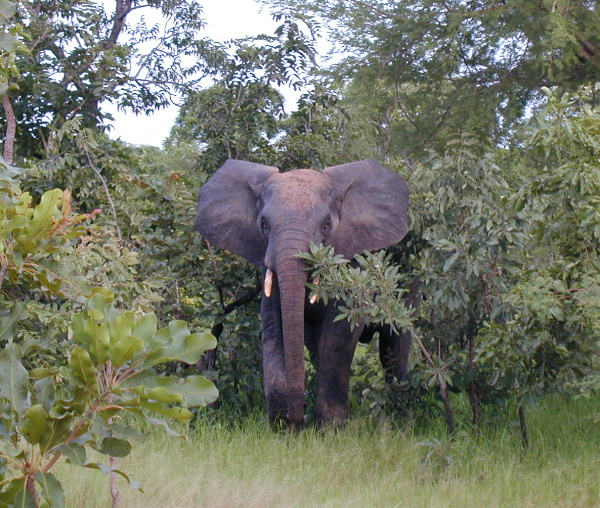
This is a snapshot of the people from the bus running away from
the elephant that was charging me.
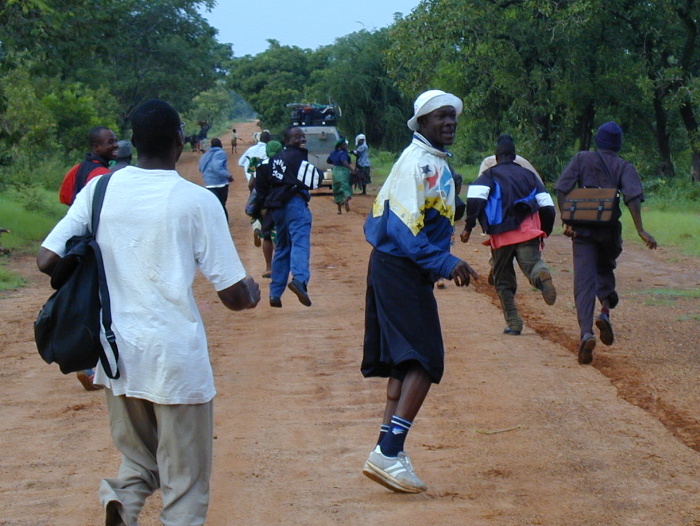
This is how Ghanaians get a haircut. Notice what the barber is holding:
a comb with a razor blade held against it. He just combs through the hair,
and the blade does the rest.
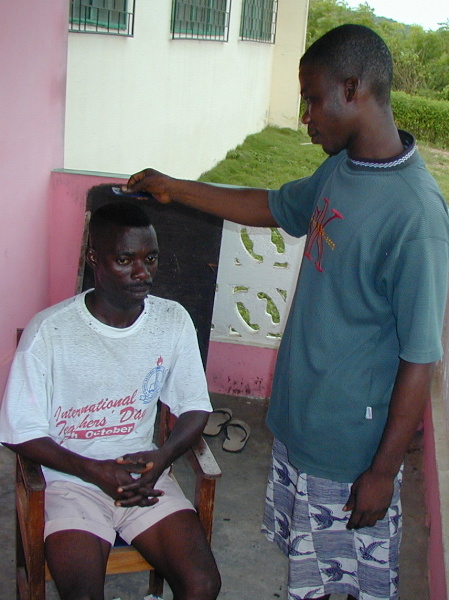
Don't look down! At Ghana's Kakum rainforest, they've built a canopy
walk made of ropes and wood. It's around 50 meters up, which gives you
a nice view of the forest.
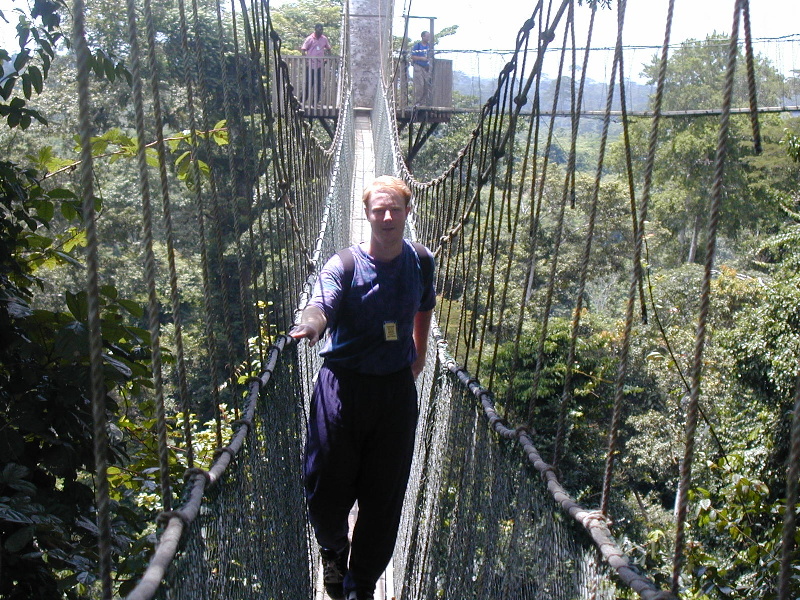
Happy New Year! Me and about thirty other Peace Corps volunteers in
Ghana partied at Kulugungu, a tiny village with no electricity right on
the border of Burkina Faso. (Which was nice because we could just pop across
the border to get some baugettes for breakfast.) We built a bonfire, shared
some beers, and generally had a great time.
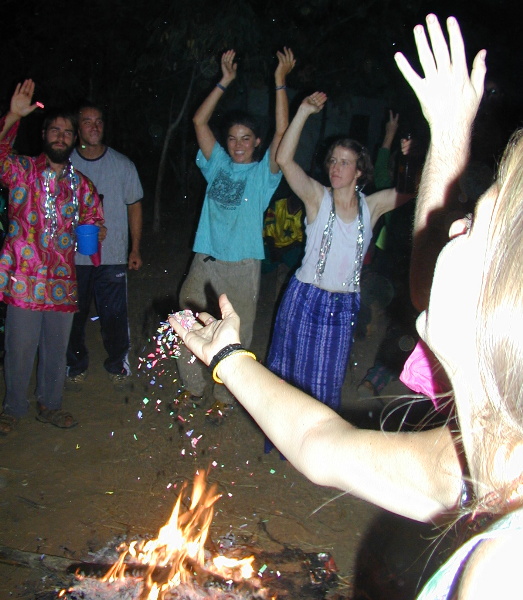
During our New Year's 2000 celebration, the host brought in some local
dancers. This guy is showing a Peace Corps volunteer bust some traditional
Upper East dance moves. (Those things on her feet are noisemakers made
with leaves and nuts.)
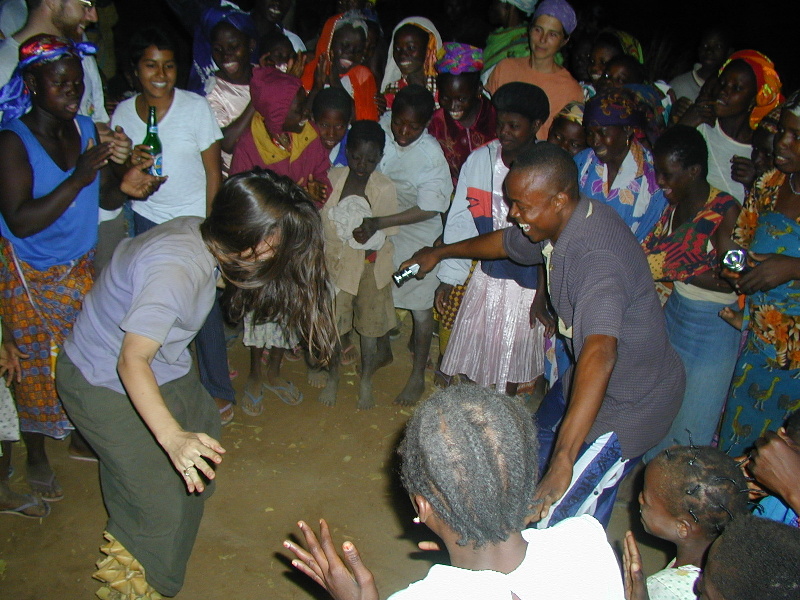
These are some of my Peace Corps friends hanging out at a bar/restaurant
down south.
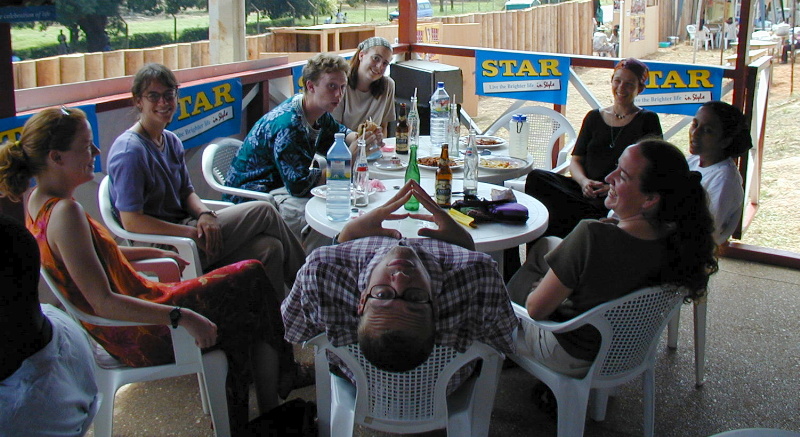
More to come...
Back to Trevor's Peace Corps page





























